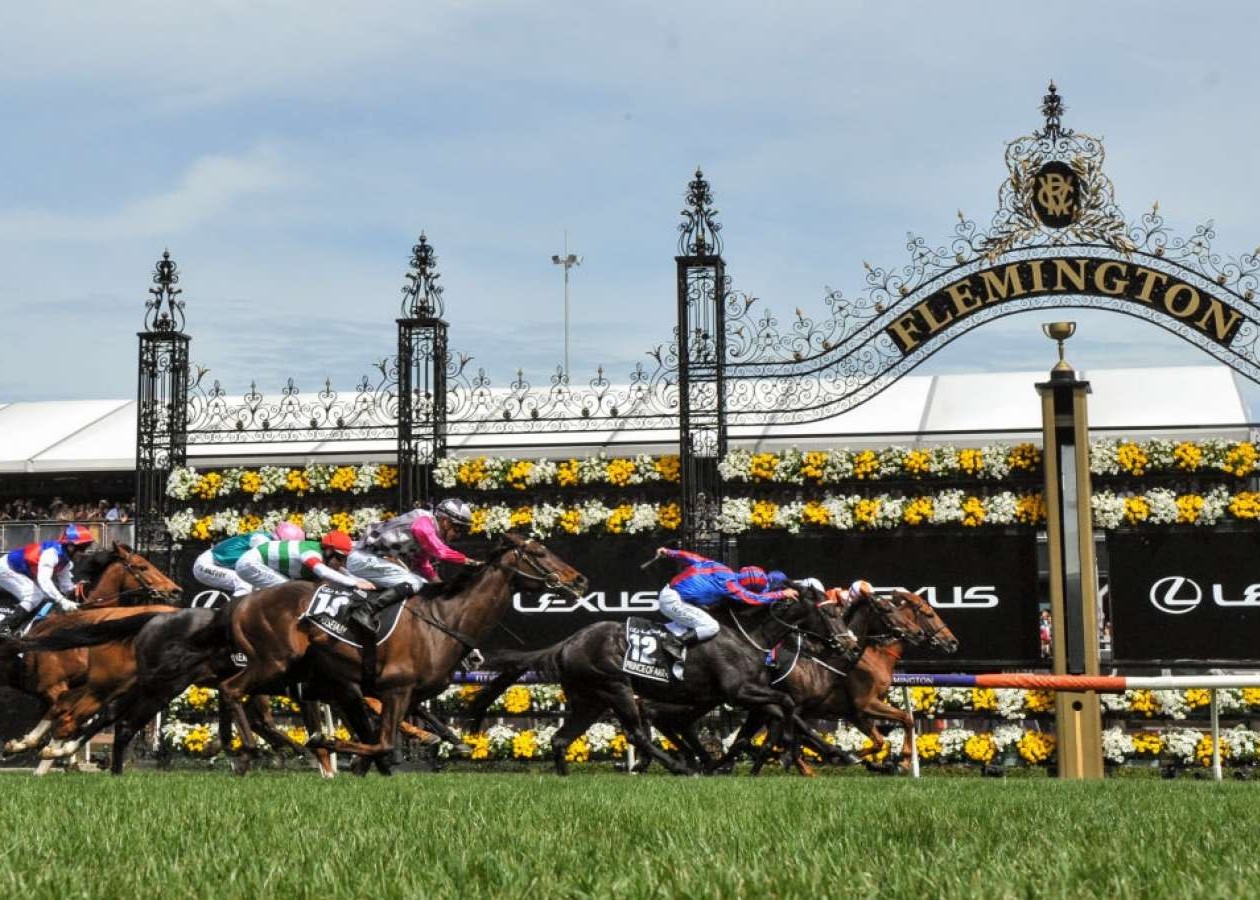The 165th running of the Melbourne Cup will see 24 finely tuned equine athletes line up for the race that stops the nation.
It’s no ordinary event – and finding the winner is no ordinary feat – but history gives us some decent insights into what horse to look for.
Historical facts and figures are a popular way for people to pick their Melbourne Cup selection so get ready for your history lesson ahead of Tuesday’s great race.
Here is a quick look at historical facts, since Archer won the first Melbourne Cup back in 1861, 164 years ago.
The history of the Melbourne Cup in facts and figures
The first Melbourne Cup was run on a Thursday, November 7, it was first run on a Tuesday in 1875.
The race has been postponed twice, both times due to rain, in 1870 and again in 1916.
During the War years – 1942 to 1944, the race was run on a Saturday, the second day of a two-day Cup carnival.
In 1863 only seven horses contested the Melbourne Cup and that is the smallest field in the race’s history.
There is a story behind the small field with several horses scratched in sympathy with Etienne de Mestre’s champion Archer being ruled out of the race when his nomination arrived in Melbourne one day late.
The largest number of runners in a Melbourne Cup was 39 in 1890.
Multiple Melbourne Cup winners
Champion mare Makybe Diva is the only horse to have won three Melbourne Cups (2003, 2004, 2005).
Four horses have won the race twice – Archer (1861, 1862), Peter Pan (1932, 1934) Rain Lover (1968, 1969) and Think Big (1974, 1975).
Caulfield Cup-Melbourne Cup winners
There have been 12 winners of the big Cups double with two this century, Without A Fight in 2023 and Ethereal in 2001.
The others were Poseidon (1906), The Trump (1937), Rivette (1939), Rising Fast (1954), Even Stevens (1962), Galilee (1966), Gurner’s Lane (1982), Let’s Elope (1991), Doriemus (1995) and Might And Power (1997).
This year Half Yours will try to become the 13th horse to do the Cups double.
Most Melbourne Cup Wins – Trainer
12 wins – Bart Cummings (1965, 1966, 1967, 1974, 1975, 1977, 1979, 1990, 1991, 1996, 1999, 2008).
Current trainers – Lee Freedman five wins (1989, 1992, 1995, 2004, 2005).
Two wins for Joseph O’Brien (2017 and 2020), Robert Hickmott (2012 and 2016) and Sheila Laxon (2001, 2024) – Note the 2024 win was in partnership with John Symons.
David Hayes (1994), Mike Moroney (2000), Sheila Laxon (2001), Graeme Rogerson (2007), Mark Kavanagh (2009), Gai Waterhouse (2013), Danny O’Brien (2019), Chris Waller (2021), Ciaron Maher and David Eustace (2022), Anthony and Sam Freedman (2023) and John Symons (in partnership with Sheila Laxon) (2024) have won the Melbourne Cup once.
Ciaron Maher and David Eustace became the first training partnership to win the race courtesy of Gold Trip’s success in 2022 and father son training team of Anthony and Sam Freedman emulated the feat in 2023 with Without A Fight before John Symons and Sheila Laxon made it a trifecta in 2024.
Most Melbourne Cup Wins – Jockey
Bobbie Lewis (1902, 1915, 1919, 1927) and Harry White (1974, 1975, 1978, 1979) hold the record with four wins each.
Current riders – 3 wins for Kerrin McEvoy (2000, 2016, 2018) while Mark Zahra has won the race twice (2022 and 2023).
Blake Shinn (2008), Craig Williams (2019), Jye McNeil (2020), James McDonald (2021) and Robbie Dolan (2024) have won the race once.
Melbourne Cup Female Jockey Facts
Michelle Payne is the only female jockey to win the Melbourne Cup – Prince Of Penzance in 2015.
Maree Lyndon was the first female to ride in the Melbourne Cup aboard unplaced Argonaut Style in 1987.
The first Australian female jockey to ride in the Melbourne Cup was Clare Lindop aboard the unplaced Debben in 2003.
Of the current crop of female riders, Jamie Melham has ridden in the race four time, her best result was a third placing on Prince Of Arran in 2020 and Okita Soushi in 2024 while Rachel King rode in the race the past three years and she finished 10th in 2023 on Military Mission.
In 2024, four female jockeys rode in the race making it the largest female participation in the Melbourne Cup’s 164-year history. The other two female riders were UK jockey Hollie Doyle who finished 14th on Sea King while Winona Costin placed 20th aboard Positivity.
Melbourne Cup Barrier Statistics
Barrier positions were first used in the Melbourne Cup in 1920, and it wasn’t until 1958 that barrier stalls replaced rope starts.
Barrier 5 has been the most successful stall producing 10 winners; most recently launching Knight’s Choice to victory in 2024.
Barrier 11 is the second most successful starting position with nine winners, the last was Americain in 2010.
The last time the same Melbourne Cup barrier produced back-to-back winners was in 2012 and 2013 when Green Moon and Fiorente won from barrier 5.
The last Melbourne Cup winner to salute from the outside barrier of 24 was Gala Supreme (1973).
The least successful barriers with only two winners each are barrier 2, Might And Power was its last winner in 1998, barrier 18 joined the club in 2021 courtesy of Verry Elleegant’s victory and barrier 23, which has not tasted success since Van Der Hum’s famous win in the slop back in 1976.
The longest winning drought is barrier 6 which hasn’t produced a winner for more than 60 years, the last was the great Light Fingers in 1965.
Barriers yet to win a race this century are – barriers 2, 6, 15, 20, 23 and 24.
Melbourne Cup Winner Stats – Age
Four and five-year-old horses have the best record in the Melbourne Cup. 4YOs have won 46 times, 2019 was the last time a four-year-old won the race when Vow And Declare was successful.
Recent times have distorted the age history of the Melbourne Cup due to the Northern Hemisphere-bred runners having their age rounded up when racing in Australia.
Rekindling and Cross Counter won the race in 2017 and 2018 respectively. Both were Northern Hemisphere 3YOs at the time but in racing records it shows them as being 4YOs when they won the Melbourne Cup.
A total of 45 5YOs have won the Melbourne Cup, including the 2024 winner Knight’s Choice.
Only three eight-year-olds have won the Melbourne Cup: Catalogue (1938), Toryboy (1865) and Twilight Payment (2020) who won as a European 7YO racing as an 8YO in Australia.
Six-year-olds have performed well in the race in recent years winning seven times since 2010, five of which were European 5YOs, while another from the Northern Hemisphere, Without A Fight was classified as a 7YO when winning the race in 2023.
Melbourne Cup Winner Stats – Sex
Stallions (entires) hold the record with 68 wins in the race.
Geldings have won the race on 58 occasions, Knight’s Choice was the most recent to add to this tally in 2024.
Just 14 mares in total, 12 individuals, have won the Melbourne Cup – Verry Elleegant was the last mare to win the race in 2021 while Makybe Diva is the most famous, winning the race in 2003, 2004 and 2005.
Winning horse colours
The colour bay is a clear standout having produced 71 Melbourne Cup winners, most recently Knight’s Choice in 2024, almost double the next best, brown with 40 winners including Without A Fight in 2023.
Chestnuts have won 37 Melbourne Cups, the last was Vow And Declare in 2019 while six greys have saluted, the last being Efficient in 2007.
Black horses have claimed just three victories, most recently Clean Sweep all the way back in 1900.
Bay/Brown horses have won five Melbourne Cups, the last was Might And Power in 1997 and brown/black has twice been the winning colour, White Nose in 1931 the last.
Words in Melbourne Cup winners’ names
One-word names have won the most Melbourne Cups with Rekindling in 2017 the last of 98 winners.
Sixty-eight horses have won the race with two-word names including 2024 winner Knight’s Choice and eight winners have had three-word names, Without A Fight was the last in 2023.
No horse has won the Melbourne Cup with a four-word name.
Melbourne Cup Weight Facts
Since the year 2000, the most successful Melbourne Cup winning weights have been 51 to 51.5kg with five winners while 52 to 52.5kg and 54 to 54.5kg have each have won four Melbourne Cups since 2000.
55 to 55.5kg and 56 to 56.5kg have won three Melbourne Cups since 2000 while 53 to 53.5kg and 57 to 57.5kg have both won the race on two occasions.
The heaviest weight carried to victory since 2000 was Makybe Diva in 2005 when she carried 58kg to win her third Melbourne Cup. She is the only winner in the 58 to 58.5kg weight bracket.
In 2024, Knight’s Choice carried 51.5kg to victory while Without A Fight won the race in 2023 carrying 56.5kg.
The lightest weight carried to victory since 2000 was Brew in 2000. He carried 49kg but in 2025 the minimum Melbourne Cup weight is 51kg due to the increasing size of the human race.
The highest weight carried to victory in the Melbourne Cup was carried by Carbine 1890. The Australian Racing Hall Of Fame Legend carried 10 stone 5 pounds, which is close to 66kg when converted.
This year, one of the favourites Al Riffa has to carry 59kg.
The last horse to carry 59kg or more to win the Melbourne Cup was Rain Lover (60.5kg) in 1969, 56 years ago while Think Big won his second Melbourne Cup carrying 58.5kg in 1975.
It should be noted that Makybe Diva carried 58kg to victory in 2005 and Verry Elleegant lumped 57kg when she won the race in 2021, as mares’ get a 2kg weight allowance so that have achieved a similar feat to what Al Riffa is being asked to do on Tuesday.
Best lead-up form races since 2000
Six of the past 25 Melbourne Cup winners have come through the Cox Plate, Gold Trip the last to do it in 2022 when he checked in ninth at The Valley a week after finishing second in the Caulfield Cup.
The Caulfield Cup has been used successfully as the final lead-up race on six occasions, the latest being 2023 when Without A Fight became the first horse since Ethereal in 2001 to do the Caulfield and Melbourne Cup double.
In 2024, Knight’s Choice finished fifth in the Bendigo Cup leading up to his Melbourne Cup triumph.
The best Northern Hemisphere lead-up race has proven to be the Irish St Leger which has produced two Melbourne Cup winners – Cross Counter in 2018 and Twilight Payment in 2020.
The Melbourne Cup curse
The number 18 is something you don’t want near your horse, saddlecloth, or barrier.
Barrier 18 has only produced one Melbourne Cup winner, Verry Elleegant in 2021, the 161st running of the race, while the number 18 has also only been carried to victory once, in 1932, 90 years ago on the great Peter Pan.
Saddlecloth 20 is also cursed, having not won the race since Gaulus carried it to victory in 1897, 127 years ago.
Good luck!

